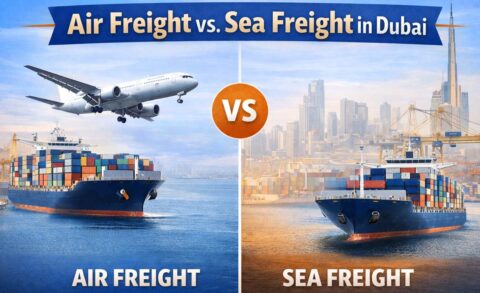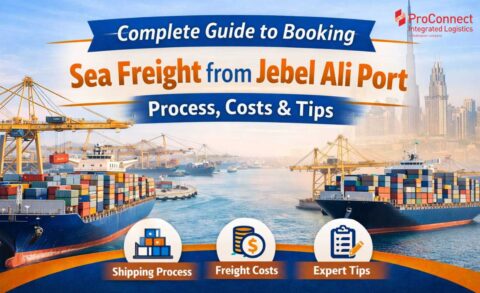Dubai is one of the world’s busiest trade hubs, where every shipment entering or leaving the UAE must pass through a well-defined customs process. For importers, exporters, and freight forwarders, understanding the Dubai customs clearance documents is not just about compliance.
It is about ensuring shipments move without delay or penalty. Each document serves a specific purpose in proving value, origin, and legitimacy, helping businesses clear goods efficiently and stay compliant with UAE trade laws.
Understanding Customs Clearance documents in Dubai
Customs clearance is the official procedure that allows goods to move across Dubai’s borders legally. It involves submitting verified paperwork, paying customs duties and VAT, and securing approval from authorities before goods are released.
Accurate document customs clearance protects businesses from costly delays, rejections, or fines. Experienced logistics providers, like ProConnect Integrated Logistics, treat customs clearance as a critical part of the supply chain and executed with precision.

Why Customs Documents in Dubai Matter
Customs documents are the foundation of every import and export in Dubai. They prove that goods are genuine, correctly declared, and meet the requirements set by Dubai Customs and global trade authorities. Without proper paperwork, shipments simply do not move.
Well-prepared Dubai customs clearance documents also reflect a company’s reliability. They build trust with customs officials and trade partners, leading to smoother clearances in the future. Drawing on years of on-ground experience, ProConnect Integrated Logistics ensures every document is verified before submission, helping clients clear goods quickly and stay compliant with Dubai’s strict regulations.
Key Documents Required for Customs Clearance in Dubai
To complete customs clearance document in Dubai, certain documents must be prepared and submitted through the Dubai Trade portal. Each serves a distinct purpose and helps customs verify shipment details accurately.
- Commercial Invoice – Shows the value, description, and quantity of goods. It must be on company letterhead, signed, and stamped.
- Packing List – Lists the number of packages, dimensions, and weight for easy verification.
- Certificate of Origin – Confirms the country where the goods were manufactured. Issued by the Chamber of Commerce.
- Bill of Lading or Air Waybill – Acts as proof that goods have been shipped and outlines transport details.
- Import or Export Declaration – Filed with Dubai Customs to declare shipment contents and value.
- Trade License Copy – Confirms that the importer or exporter is legally registered to trade in the UAE.
- Delivery Order – Issued by the shipping line or freight forwarder to release cargo once duties are cleared.
- Customs Duty Payment Proof – Receipt showing all applicable duties and VAT have been paid.
- Special Permits (if required) – For restricted goods such as food, chemicals, or electronics, permits from relevant authorities must be included.
Step-by-Step Process for Customs Clearance in Dubai with documents
The customs clearance process in Dubai follows a few structured steps to ensure compliance and quick release of goods.
Step 1: Register with Dubai Customs or Dubai Trade
Businesses must hold a valid importer or exporter code. Companies in free zones such as JAFZA or DWC register through their respective authorities.
Step 2: Prepare and Verify Documents
Confirm that all required paperwork like invoice, packing list, and certificates is accurate before filing.
Step 3: Submit Declaration Online
Upload documents and create an import or export declaration through the Dubai Trade portal.
Step 4: Pay Customs Duties and VAT
Duties are generally 5% of the CIF value, and VAT is also 5%. Free zone shipments may qualify for exemptions.
Step 5: Inspection and Approval
Dubai Customs may inspect shipments physically or via X-ray before approving release.
Step 6: Goods Release
Once cleared, collect the delivery order and coordinate with your freight forwarder for final transport.
Common Challenges in Customs Clearance (and How to Avoid Them)
Even with the right Dubai customs clearance documents, shipments can face unexpected delays if small details are overlooked. The most common issues include missing paperwork, incorrect HS codes, unpaid duties, or lack of required permits. These often lead to inspection delays or storage costs.
The best way to avoid them is through preparation and verification. Always review documents before submission, confirm duty payments in advance, and stay updated on Dubai Customs requirements for your product category.
Pro Tips for Smooth Customs Clearance in Dubai
Efficient customs clearance depends on preparation. Start by checking that every customs clearance document matches your shipment details before it reaches the port. Even a small mismatch can delay release.
Use the Dubai Trade portal to submit declarations and track progress in real time. Keep soft copies of all documents on hand for quick reference.
Partnering with a licensed customs broker like ProConnect Integrated Logistics adds an extra layer of assurance. Our specialists verify documents, manage declarations, and coordinate directly with Dubai Customs, helping clients avoid delays and maintain full compliance.
How ProConnect Simplifies Customs Clearance
Navigating customs procedures in Dubai can feel complex, especially for time-sensitive shipments. ProConnect Integrated Logistics simplifies this process through experience, technology, and on-ground expertise.
Our licensed customs brokers handle every stage from document verification to duty payment and final release. With offices in Jebel Ali Free Zone and strong ties with Dubai Customs and Dubai Trade, we manage clearances quickly and accurately. Clients gain real-time shipment visibility, fewer delays, and full compliance with UAE regulations.
Whether importing containers, air freight, or e-commerce cargo, ProConnect ensures your goods move smoothly through Dubai’s ports and free zones with transparency and efficiency.
FAQs For Customs Clearance Documents in Dubai
What documents are required for import clearance in Dubai?
You will need a commercial invoice, packing list, certificate of origin, bill of lading or airway bill, import declaration, trade license copy, and proof of customs duty payment. Certain goods may also require special permits.
How long does customs clearance take in Dubai?
If all documents are correct, clearance can usually be completed within 24 to 48 hours. Complex or restricted shipments may take longer.
How can I pay customs duty and VAT in Dubai?
Payments are made through the Dubai Trade portal using approved digital payment methods such as e-Dirham or bank transfer.





 APP DOWNLOAD
APP DOWNLOAD